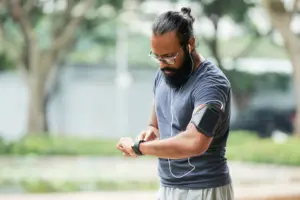
Relieve sore muscles: We all have been there. You start a new workout, lift a bit heavier than usual, or even spend the weekend helping with household chores. The next morning, you wake up with sore muscles. Your arms feel tight, your legs ache when you climb stairs, and even sitting down can be a little painful. It can feel uncomfortable, but here is some good news: muscle soreness is usually a normal part of getting stronger. With the right care, you can recover faster and feel better.
Why do muscles get sore?
After a tough or new workout, muscle soreness typically appears 12–24 hours later and can linger for a couple of days, which is called delayed onset muscle soreness (DOMS). It happens because challenging your muscles causes tiny, microscopic tears in the fibres. As your body repairs those micro-tears, the soreness fades and the muscles come back stronger and more resilient; it’s a normal part of the adaptation process.
Also Read | How much water should you drink daily to lose weight?
When is muscle soreness normal (and when is it not)?
- Normal soreness: Achy, stiff, or tender muscles that improve in 2–3 days.
- Not normal: Sharp or sudden pain, swelling, numbness, or pain that lasts more than a week. This may signal an injury, not simple soreness.
What to do about muscle soreness?
Gentle movement:
It might feel tempting to stay in bed, but complete rest can actually make soreness worse.
Stretch it out:
Stretching helps relax tight muscles and also improves flexibility. Do slow control stretches for the sore areas and hold each stretch for around 15 to 30 seconds without bouncing. Simple moves like hamstring stretches or shoulder rolls can work.
Stay hydrated:
Dehydration can make soreness feel worse. Water helps flush out toxins and support muscle recovery. You need to drink a lot of water throughout the day. Herbal teas or coconut water are also beneficial options.

Use heat or cold packs:
Both heat and cold can help, but just in different ways. Cold packs are best for reducing inflammation in the first 24 hours. Heat packs, meanwhile, are excellent for relaxing stiff muscles after the first day. Even a warm shower or soak in a hot bath with Epsom salt can ease soreness.
Prioritise sleep:
Muscles repair the most when you are sleeping. Poor sleep slows down healing and makes soreness worse. Aim for at least 7 hours of quality sleep each night and keep a consistent bedtime routine.
When to see a doctor for muscle soreness:
See a healthcare professional if:
- Pain is sharp, sudden, or severe.
- You notice swelling or bruising.
- Pain lasts more than 5–7 days.
- You struggle to move the joint or muscle.
Also Read | Strength vs. cardio: What’s better for your long-term health?
Muscle soreness is a normal sign of getting stronger. It can be uncomfortable, but it’s rarely harmful. Keep moving gently, add light stretching, and fuel well; your muscles will rebound quickly. Over time, as your body adapts to your routine, you’ll feel less soreness and more strength.








